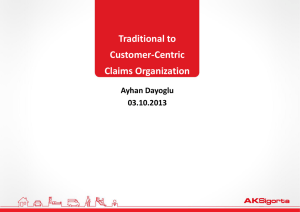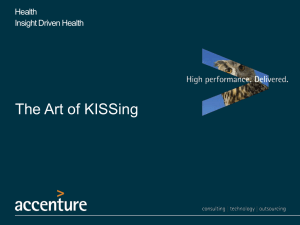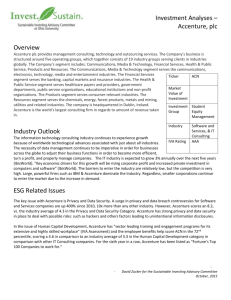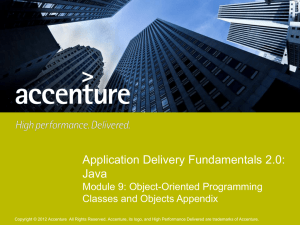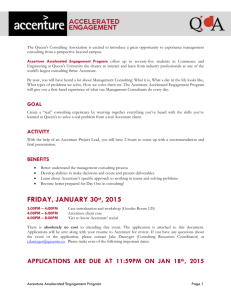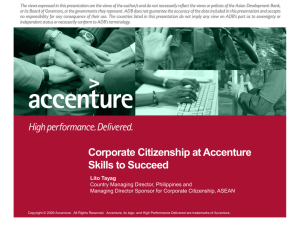What they do Accenture is a global management consulting
advertisement
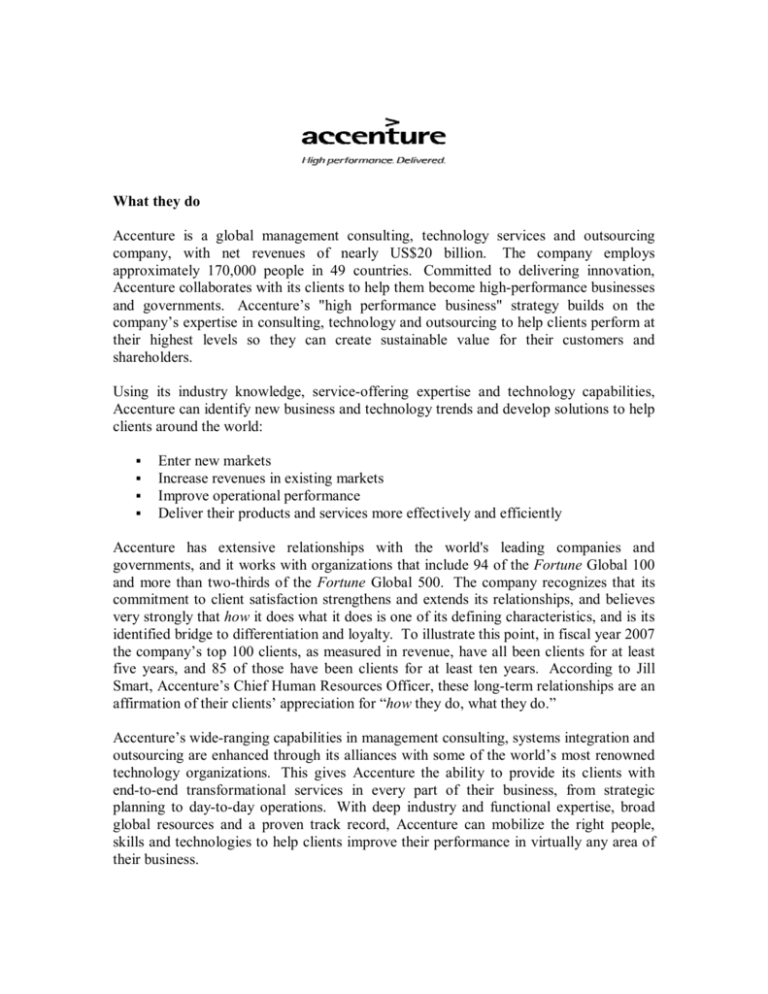
What they do Accenture is a global management consulting, technology services and outsourcing company, with net revenues of nearly US$20 billion. The company employs approximately 170,000 people in 49 countries. Committed to delivering innovation, Accenture collaborates with its clients to help them become high-performance businesses and governments. Accenture’s "high performance business" strategy builds on the company’s expertise in consulting, technology and outsourcing to help clients perform at their highest levels so they can create sustainable value for their customers and shareholders. Using its industry knowledge, service-offering expertise and technology capabilities, Accenture can identify new business and technology trends and develop solutions to help clients around the world: ! ! ! ! Enter new markets Increase revenues in existing markets Improve operational performance Deliver their products and services more effectively and efficiently Accenture has extensive relationships with the world's leading companies and governments, and it works with organizations that include 94 of the Fortune Global 100 and more than two-thirds of the Fortune Global 500. The company recognizes that its commitment to client satisfaction strengthens and extends its relationships, and believes very strongly that how it does what it does is one of its defining characteristics, and is its identified bridge to differentiation and loyalty. To illustrate this point, in fiscal year 2007 the company’s top 100 clients, as measured in revenue, have all been clients for at least five years, and 85 of those have been clients for at least ten years. According to Jill Smart, Accenture’s Chief Human Resources Officer, these long-term relationships are an affirmation of their clients’ appreciation for “how they do, what they do.” Accenture’s wide-ranging capabilities in management consulting, systems integration and outsourcing are enhanced through its alliances with some of the world’s most renowned technology organizations. This gives Accenture the ability to provide its clients with end-to-end transformational services in every part of their business, from strategic planning to day-to-day operations. With deep industry and functional expertise, broad global resources and a proven track record, Accenture can mobilize the right people, skills and technologies to help clients improve their performance in virtually any area of their business. Purpose and Values guide great service companies. Accenture’s senior leadership has held to a history of following certain beliefs and supporting consistent client-focused vision and values. About Accenture’s values Bill Green, Accenture’s current Chairman and CEO, eloquently expresses the high value they place on people and their role in creating memorable client experiences: “One of the most important issues on the minds of CEOs today is what I call the ‘people agenda.’ Most leaders agree that having a skilled, experienced and engaged workforce is critical for success. They also recognize that achieving the full potential of a workforce is a huge challenge. “To unleash the value within their workforces, leaders need to make sure that their employees are aligned with strategic goals. Employees must be laser focused on their internal and external customers and motivated to bring both intelligence and intuition to those relationships. And they must be flexible and able to adjust, as needed, to continually improve the customer experience. All of this requires leaders who not only attract, retain and invest in the right people, but also educate, energize and inspire them.” Their values Accenture’s six core values have shaped the culture and defined the character of the company, guiding employee behavior and decision-making. In the company’s own words, these values are: ! ! ! ! ! ! Stewardship: Building a heritage for future generations, acting with an owner mentality, developing people everywhere we are and meeting our commitments to all internal and external stakeholders Best People: Attracting and developing the best talent for our business, stretching our people and developing a "can do" attitude Client Value Creation: Improving our clients' business performance, creating long-term, win-win relationships and focusing on execution excellence One Global Network: Mobilizing the power of teaming to deliver consistently exceptional service to our clients anywhere in the world Respect for the Individual: Valuing diversity, ensuring an interesting and inclusive environment and treating people as we would like to be treated ourselves Integrity: Inspiring trust by taking responsibility, acting ethically and encouraging honest and open debate In a conversation with Jill Smart, she shared her views about how the company’s values affect her personally. “I have been with Accenture for 27 years, and it is our culture that keeps me here. Our culture is truly shaped and defined by our values. These are not just words; our values permeate all we do, because our people live them every day.” She continued with an illustration: “You just mentioned Stewardship, which is about building a better future for the next generation of people. Every day, our leaders make decisions on the basis of what is best for our clients and their futures, not just about what is best for Accenture. Their decisions are not based on what is the best thing for them as an individual …it is based on what is best for our clients and, therefore, for Accenture. This is an example of living our values, isn’t it?” Jill’s excitement about this topic was palpable as she continued. “Internally, our culture is non-competitive. Of course we compete in the marketplace, and do so very well, but amongst us, the focus is on teamwork and collaboration. You will not succeed at Accenture if you cannot work effectively as a team member. Everyone has that owner mentality and, therefore, a stake in the collective success of the company.” What is high-performance? Accenture defines high-performance businesses as those that: ! ! ! Effectively balance current needs and future opportunities Consistently outperform peers in revenue growth, profitability and total return to shareholders Sustain their superiority across time, business cycles, industry disruptions and changes in leadership And how do high-performers achieve these feats? The company’s research has identified the "how" as the building blocks of high performance: ! Market Focus and Position: Market focus and position are the "where and how to compete" aspects of business strategy. High-performance businesses seek unique insights into drivers of current and future value, anticipate changes and translate rapidly into differentiated operating models and business architectures. Moreover, they focus continuously on business model and service innovation, making markets, rather than just riding them. ! Distinctive Capabilities: In addition to concentrating on market position and scale, top performers also focus on mastering distinctive capabilities relevant to their target customers. ! Performance Anatomy: If distinctive capabilities can be thought of in terms of functional mastery, performance anatomy is about the organizational characteristics that underpin these capabilities. High-performance businesses unleash the organization's energies and core competencies; accelerate insight into action to out-execute competition; and manage the balance between today and tomorrow. Performance anatomy is not just a fancy term for culture. It is determined by the mindset top management brings to such diverse areas as strategy, planning and financial control, leadership and people development, performance management and use of information technology. High-performance businesses continually balance, align and renew the three building blocks of high-performance, creating their competitive essence through a careful combination of insight and action. Performance Anatomy: A deeper view During my conversation with Jill, I asked her to expand on Accenture’s approach to differentiation. She began by clarifying their commitment to consistency. “Being a truly global company, we have developed an Accenture methodology, in which all of our professionals are well-versed. We need to be certain that we are delivering the same experience, and taking the same approaches with our clients around the globe.” Competing companies can, for a time, appear almost identical. They may share the same targeted markets, business model, revenue base and employee compensation levels, among countless other features. But over time, these companies' performances start to vary, and soon it becomes obvious they never really were the same. Where they differ is in something Accenture’s research calls performance anatomy. Performance anatomy runs deep inside an organization, and it affects all of its employees and functions. Performance anatomy is neither hereditary nor accidental. It is the outcome of deliberate choices made by senior executives. Yet it is also by nature elusive, rarely if ever reducible to a statement of vision and values. It represents a unique way of approaching the core elements common to every business: leadership and strategy, people development, technology enablement, performance management and innovation. In other words, performance anatomy is similar to culture in that it expresses the vision and values of the organization – especially those of the founders. But it is different in that it contains very clear and explicit directions for how each of those core elements ought to be managed and what competencies the organization needs to develop to achieve high performance. Performance anatomy represents a distinctive perspective on the interaction and the integration of those core elements; that is, how and why they relate to one another the way they do. High-performance businesses, Accenture argues, actively manage the interaction between leadership and strategy, people development, IT enablement, performance measurement and innovation in a way that produces outstanding and sustainable results. Conventional treatments of culture provide little insight into how companies manage these interactions; performance anatomy does. CEOs and their top management teams make integration of those elements a primary responsibility, whether they do it intuitively or programmatically. Indeed, the ability of a top management team to actively build the organization's performance anatomy is testimony to its deep understanding of the competitive essence of the business. Thus, performance anatomy represents more than values and assumptions. It represents a touchstone, guarded and stewarded by the CEO, which aligns the top management team; a touchstone that is absolutely essential in an increasingly turbulent and uncertain business environment. The impact of performance anatomy is profound. It touches decisions about organization design, business models, incentives and values and top management team composition and succession; it affects the long-term effectiveness, quality and speed of decision making, as well as the mastery of change and innovation productivity. But most importantly, it connects people all along the operational continuum. Bringing it together: Client Relationships In serving its clients, Accenture works hard at sorting out the “what” from the “how” in order to differentiate itself from its competitors. Marco Ziegler, a senior executive, has been involved with many of Accenture’s consumer products and retail client teams throughout his career; Best Buy, Barnes & Noble, Kimberly-Clark and Wrigley are just a few. He talks about Accenture’s people and service-centric culture with great passion. “Our people contribute to the client relationship process significantly. In fact, they are the very fabric of its strength,” he says. He goes on to describe how the company directs teams locally and globally. “Accountability through collaboration is at the center of how we manage clients globally. The culture of Accenture is the same throughout the world, but we obviously incorporate the culture of the locale.” In discussing the pride Accenture takes in its client performance, he described how the company monitors that through client surveys taken every six months, as well as through quarterly reviews that further examine client satisfaction. “We have experienced senior consultants whose primary role is to interview clients ‘one to one’ to evaluate the level of client satisfaction and the state of that relationship,” he says. “These certified partners in performance quality are not members of a specific team, but rather are independent of a client team’s on-going work.” Marco went on to emphasize that 70 to 80 percent of the feedback is about how Accenture people do what they do. We talked about the traits that embody Accenture’s individuals and client teams. “Excellence in all we do guides us, and we are ever mindful of our purpose and values,” he commented. “We are cooperative toward each other, positive in attitude, optimistic and humble in our approach to clients.” He further explained, “We are proactive in ‘getting things done.’ We consider ourselves a flat organization; thus if a client has a question or concern that a team can’t answer, we will find that answer somewhere in our company post haste.” Differentiation through Service Excellence is an accepted premise within Accenture. The company conducts ongoing training for employees of all levels, from analysts through senior executives, and certifies certain competencies at all levels. Built into every one of their “schools” are the service behaviors the company expects of its client-interacting people. This focus on external client service applies equally to the company’s internal service expectations. Jill quantified Accenture’s ardent commitment to training by noting that; “Last year, we spent more than $700 million on formal training programs. Sure, we train our people on ‘what’ we do; but we also put significant resources against the ‘how.’ Accenture’s people, culture and client loyalty are all intertwined. “Very simply, we are known for helping our clients achieve high performance and for the individuals and teams who make that happen. When clients first hire Accenture, they do so largely because of ‘what’ we do – we deliver high performance. But our client loyalty demonstrates that we are re-hired and retained because of ‘how’ we do, what we do. And that is a testament to our people.” In an earlier chapter we talked about how Starbucks is known for its coffee, but their people make them famous. So it is with Accenture; what a great tribute.

